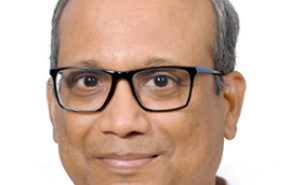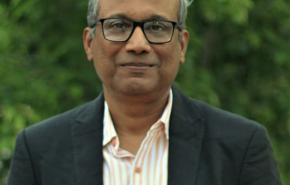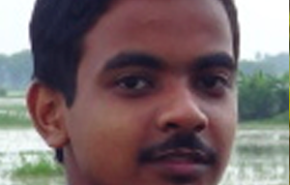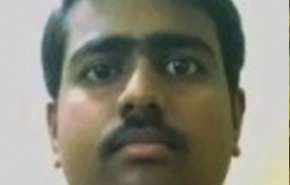






Professor Arup Bose, an Indian citizen born in 1959, obtained his Bachelors, Masters and Doctorate degrees from the Indian Statistical Institute. After spending four years as an Assistant Professor at Purdue University, in 1991 he joined his alma mater as an Associate Professor. He became a Full Professor in 1995, and moved to its newest grade (HAG) when it was introduced in 2011. He has taken up occasional visiting positions abroad.
Professor Bose’s research contribution is outstanding, with more than 150 publications in leading Statistics, Probability and Economics journals. He has published 5 books so far and is currently writing three more. He has made original contributions to both theory and methods, and these have found applications in diverse fields. Though his research work often involves difficult probability and mathematical theory, he has over 2000 Google scholar citations, showing that his work has been widely recognized and seminal in his fields of research. To name a few achievements, Arup Bose provided extremely novel applications of results from stochastic processes to derive asymptotic properties of maximum likelihood and Bayes estimates in nonlinear diusion processes. He provided a unified and comprehensive study of deep convergence properties of existing and new bootstrap and resampling schemes in a variety of estimators and models. He obtained higher order properties of a collection of sequential estimates in a very general framework. He achieved deep limiting results for U-statistics. He constructed a unified limiting theory of patterned random matrices. His recent book Random Matrices and Non-Commutative Probability is highlighting his many contributions to the field.
The S.S. Bhatnagar Award is the most well-known award for Indian scientists below the age 45 and is conferred by the Prime Minister. Prof. Bose won this award in 2004. He has also won the C.R. Rao National Award in Statistics from the Ministry of Statistics, Govt. of India, the P.C. Mahalanobis Medal from the Indian National Science Academy, and the Young Researcher Award from the International Indian Statistical Association.
J.C. Bose Fellowships, awarded by the Dept. of Science and Technology (DST), Govt. of India, are the most generous fellowships for senior scientists of the country. It is renewable every 5 years, but competition is tough since one out of every three fellowships is not renewed by rule. Professor Bose was awarded this fellowship in 2009. His research contributions have been so deep and prolific, that he has obtained two rare extensions, till Dec. 2023.
Professor Bose is an elected Fellow of the Institute of Mathematical Statistics (IMS, USA), the Indian National Science Academy (INSA), the Indian Academy of Sciences (IASc.), the National Academy of Sciences, India (NASI) and the Indian Society for Probability and Statistics. He is also an Elected member of the International Statistical Institute.
Professor Bose has contributed with dedication to the profession. He has actively participated in committees for the IMS, ISI, Bernoulli Society, and the International Mathematical Union. Nationally, he has continued to serve and lead may of the scientific bodies/committees, under the auspices of the Govt. of India, such as the National Board for Higher Mathematics of Dept. of Atomic Energy, and the Policy Advisory Committees of Science and Education Research Board (SERB) of DST. He has also been serving in several important committees of the three Science Academies, INSA, IASC, and NASI. He has freely given his time for necessary academic administration with his Institute and other Institutions across India.
Sankhy¯a, was founded by P.C.Mahalanobis. Bose became a co-editor at the age of 34. He was a Co-editor for 8 years, doubling up as a Managing Editor for 5, and an Editor for 6. His service and dedication to the journal has been truly unparalleled. He has served many other journals, and is currently an Editor-in Chief of Random Matrix Theory and Applications.
His current research interests include high dimensional data, resampling, large dimensional random matrices, non-commutative probability, large dimensional time series and spectral inference. His earlier work includes, but not limited to, non-parametric methods, resampling, kernel density estimation, U-statistics, Mm-estimates, and strong and weak limit theorems.
He has worked on some of the most current and useful topics in probability and statistics, both singly and with generations of statisticians and probabilists. Many of his more than 65 collaborators are his mentees from their Bachelor’s and Master’s student days. He has dozens of major works with them.
His works have found applications in many areas of importance. For example his works on resampling in time series and estimating equations in dependent models are highly cited by researchers in both theory and applications. His recent works in large dimensional matrices in high dimensional time series are being found to be very useful in statistical inference in such models. These ideas hold the potential for further applications.
Professor Bose has been a pioneer in introducing new statistical concepts to the Indian subcontinent. He has an unparalleled record in India with regard to research, mentoring and overall capacity building. He has developed many research topics, became a global leader in these subjects, and in the process motivated many young minds to work in these areas.
He is a true inspiration to his students. He has directly supervised/mentored over 50 students at various levels, including PhDs, Master’s Dissertations, Master’s projects, Summer projects, and has also guided independent reading. Many of his publications have been co-authored with them, setting them firmly on the track of research and academia. These students are now faculty at some of the best academic institutions in the world. They have gone on to receive various accolades while being under his wings and after that.
The variety and depth of his teaching is highly remarkable. He has taught courses as varied as Design of Experiments, Sample Surveys, Inference, Measure Theory, Stochastic Processes, Resampling, Random Matrices, Non-Commutative Probability, to name a few. He gave the first modern course on Time Series in his Institute. Master’s courses in Resampling and in Random Matrices have been introduced in the Indian Statistical Institute, following his leading works these areas. The first batch of students for these courses were taught by him.
In the last 15 years or so, he has lectured regularly on Random Matrices for the benefit of Master’s and PhD students. There are now many researchers working in theory and applications in random Matrices in India, and their beginnings can be traced back to interactions with Prof. Bose. He has 4 books on Random Matrices, with a plan for more. This has made the difficult subject of Random Matrices and Non-commutative Probability accessible to young students and newcomers to this very important area.
He has been involved in more than 100 seminars and conferences, either as an organizer or as speaker delivering plenary talks, keynote talks, special invited talks. He has also given series of lectures, often tailor made, at organisations such as the Reserve Bank of India.
At the age of 64, he is one of the most active and approachable statisticians in the country. With a never say no attitude, he travels extensively to universities and research institutes across the country for outreach and other activities. He is always a willing and active collaborator, forming bridges between institutions and its members. He has ties with scientists from other countries, covering statistics and allied disciplines.



Paper: Testing in Additive and Projection Pursuit Models